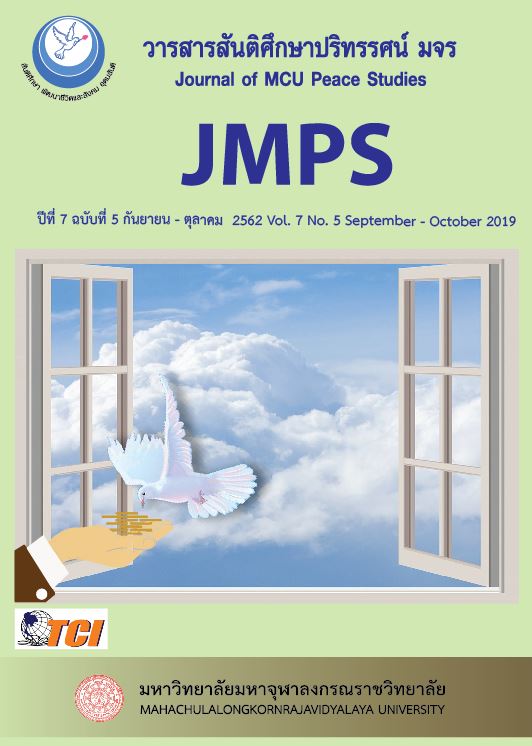รูปแบบการพัฒนาการจัดการท่องเที่ยวเชิงเกษตรของจังหวัดอุบลราชธานี
Main Article Content
บทคัดย่อ
บทความนี้มีวัตถุประสงค์เพื่อ 1) ศึกษาสภาพการจัดการท่องเที่ยวเชิงเกษตรของจังหวัดอุบลราชธานี 2) พัฒนารูปแบบการพัฒนาการจัดการท่องเที่ยวเชิงเกษตรของจังหวัดอุบลราชธานี และ 3) ประเมินรูปแบบการพัฒนาการจัดการท่องเที่ยวเชิงเกษตรของจังหวัดอุบลราชธานี กลุ่มเป้าหมายที่ใช้ในการศึกษา ประกอบด้วย ผู้ที่เกี่ยวข้องกับการดำเนินการท่องเที่ยวเชิงเกษตรจังหวัดอุบลราชธานี จำนวน 60 คน ผู้เชี่ยวชาญพิจารณาร่างรูปแบบ จำนวน 12 คน และผู้ทรงคุณวุฒิในการประเมินรูปแบบ จำนวน 17 คน เครื่องมือที่ใช้ในการรวบรวมข้อมูล ได้แก่ แบบสอบถาม แบบบันทึกการสนทนากลุ่มและแบบประเมิน วิเคราะห์ข้อมูลโดยการหาค่าเฉลี่ย ส่วนเบี่ยงเบนมาตรฐานและการวิเคราะห์เนื้อหา ผลการวิจัยพบว่า 1) การจัดการท่องเที่ยวเชิงเกษตรของจังหวัดอุบลราชธานีอยู่ในระดับปานกลาง 2) รูปแบบการพัฒนาการจัดการท่องเที่ยวเชิงเกษตรของจังหวัดอุบลราชธานี ประกอบด้วย 2.1) การบริหารจัดการของแหล่งท่องเที่ยว โดยการมีโครงสร้างในการบริหารจัดการ การมีกระบวนการจัดการ การจัดการให้เป็นฐานแห่งการเรียนรู้และแหล่งท่องเที่ยวครบวงจร การสร้างเครือข่ายการท่องเที่ยว การประสานงานกับหน่วยงานที่เกี่ยวข้อง และการจัดการแบบมีส่วนร่วม 2.2) การจัดการสถานที่ โดยการจัดการพื้นที่และภูมิทัศน์ การจัดการที่พักในรูปแบบโฮมสเตย์ การอนุรักษ์ทรัพยากรธรรมชาติ และการจัดการสถานที่แบบมีส่วนร่วม 2.3) การจัดการให้บริการและกิจกรรม โดยการให้บริการตามรูปแบบของแหล่งท่องเที่ยวเชิงเกษตร การบริการความรู้ การอำนวยความสะดวก การให้ความปลอดภัย การจัดให้มีส่วนร่วมในการทำกิจกรรม และการจัดกิจกรรมที่ดึงดูดใจ 2.4) การจัดการพัฒนาบุคลากร โดยการพัฒนาความรู้ การเตรียมความพร้อมของมัคคุเทศก์ การพัฒนาบุคลากรในภาคธุรกิจ องค์กรท้องถิ่น และหน่วยงานภาครัฐ 2.5) การจัดการด้านการตลาด โดยการจำหน่ายผลิตภัณฑ์ทางการเกษตร การสร้างรายได้จากภาคีเครือข่าย การประชาสัมพันธ์ การสร้างความดึงดูดใจ การเชื่อมโยงกับการท่องเที่ยวประเภทอื่น การสร้างมูลค่าเพิ่ม และการสร้างรายได้ให้กับชุมชน 3) ผลการประเมินรูปแบบโดยผู้ทรงคุณวุฒิ พบว่า รูปแบบมีความเหมาะสมในระดับมากที่สุดและมีความเป็นไปได้ในระดับมาก
Article Details
ทัศนะและความคิดเห็นที่ปรากฏในบทความในวารสาร ถือเป็นความรับผิดชอบของผู้เขียนบทความนั้น และไม่ถือเป็นทัศนะและความรับผิดชอบของกองบรรณาธิการ ยินยอมว่าบทความเป็นลิขสิทธิ์ของวารสาร
เอกสารอ้างอิง
Bhujbal, M. B., & Joshi, P. V. (2012). Agro-Tourism A Specialized Rural Tourism: Innovative Product of Rural Market. International Journal of Business and Management Tomorrow, 2(1), 1-12.
BLT Bangkok. (2019). Foreign tourists statistics. Retrieved June 26, 2019, from http://www.bltbangkok.com/article/info/3/1324.
Boit, J. C. (2013). The role of destination attributes and visitor satisfaction on tourist repeat visit intentions to Lake Nakuru National Park, Kenya. Master Abstracts International, 52(2), 6012-A.
Department of Agriculture Extension. (2012). Agricultural tourists statistics. Retrieved March 8, 2018, from http://agrotourism.doae.go.th/agro-stat.html.
Department of Tourism. (2013). Tourist situation summary 2013. Retrieved April 21, 2018, from http://www.m-society.go.th/article_attach/11259/15586.pdf
Jussapalo, S. (2015). Agro-tourism Management of Bangrieang Tai Community, Kuanneing District, Songkhla Province. RMU.J. (Humanities and Social Sciences), 9(1), 113-124.
Kerdpokha, R. (2010). Guideline on Sustainable Ecotourism Development of Uthaithani Province. Thesis Master. National Institute of Development Administration.
Khamphuang, D. (2016). Network for the Development of Agro-Tourism Routes in Pakchong District, Nakhon Ratchasima Province. Thesis Master. Chiang Mai: Chiang Mai University.
Kongekapop, N. (2014). Agro-Tourism Extension Needs for Phuket Pineapple Plantation in Thalang District of Phuket Province. Thesis Master. Nonthaburi: Sukhothai Thammathirat Open University.
Kunok, C. (2017). Scenarios of Community-based Network Governance on Local Agricultural Tourism Development: A case Study of Bo kae and Bo Tong Commumities, Kud Rang District, Mahasarakham Province. Dissertation Doctor of Philosophy. Bangkok: Kasetsart University.
Manmungsin, S. (2016). Adoption of Agro-tourism Development of Community in Doi Wiang Village, Ban Thi Sub-district, Ban Thi District, Lamphun Province. Thesis Master. Chiang Mai: Chiang Mai University.
Ministry of Tourism and Sports. (2012). National Tourism Development Plan 2012-2016. Bangkok: Ministry of Tourism and Sports.
Nadee, P. (2018). Agro-Tourism Development towards Sustainable tourism. EAU Heritage Journal, 8(2), 113–124.
Na Songkhla, T. (2011). Interaction Between Agrotourism and Local Agricultural Resources Management: A case of Changklang Agrotourism, Nakornsritammarat Province. MIS Journal of Naresuan University, 6(2), 1–12.
Office of National Economics and Social Development Board (NESDB). (2012). The National Economics and Social Development Plan no.11, 2012-2016. Bangkok: NESDB.
Peanjaroen, K., & Tantasuttikul, S. (2012). Community – Based Tourism Management Case Study Koh-Yor Agro - tourism Community Muang District, Songkhla Province (Research report). Songkhla: Rajamangala University of Technology Srivijaya.
Prachachat. (2018). Keep an eye on the Thai tourism year 2018. Retrieved March 2, 2018, from https://www.prachachat.net/tourism/news-95937
Seansing, K. (2009). A Study of Agro-Ecotourism Practice with Community Involvement: A Case of Bua-Theung Village at Tha Chang, Swangwirawong District, Ubon Ratchathani. Thesis Master. Ubon Ratchathani: Ubon Ratchathani University.
Suwannakood, S. (2016). The Development of Creatives for Agro-Tourism in Nayia Community, Nayia Sub-District, Ubon Ratchathani Province. Thesis Master. UbonRatchathani: Ubon Ratchathani University.
Ubon Ratchathani Provincial Office. (2016). Ubon Ratchathani Provincial Development Plan (2018 - 2021). Ubon Ratchathani: Ubon Ratchathani Provincial Office.
Ubon Ratchathani Community Development Office. (2017). Community plan for strategic driving Ubon Ratchathani. Ubon Ratchathani: Ubon Ratchathani Community Development Office.
Wannapo, P. (2016). Public Participation in Agrotourism: A Case Study of Ban Seien Com-munity, Village Number 8. Songsalueng Sun District, Amphoe Klang, Rayong Province. Thesis Master. Chon Buri: Burapa University.


